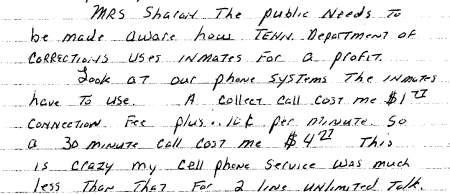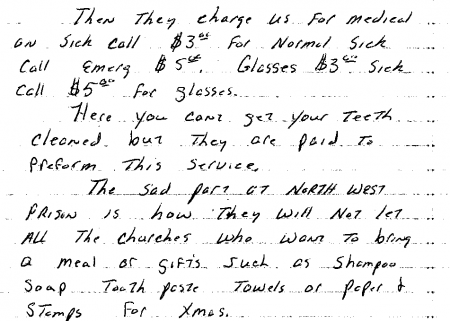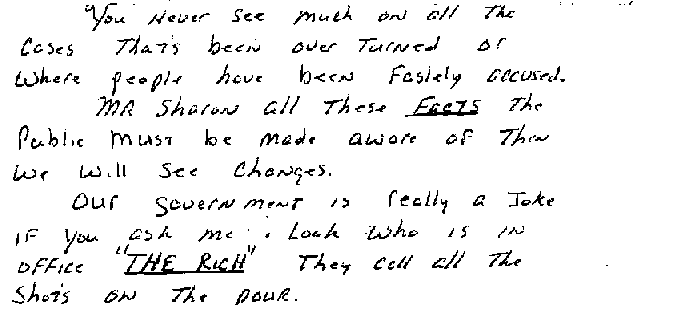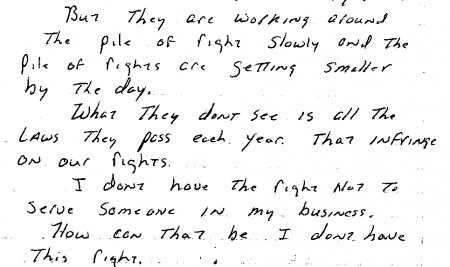LACK OF MEDICAL, DENTAL CARE; PRISONERS-FOR-PROFIT
by Sharon Rondeau
 (Oct. 29, 2015) — Since Walter Francis Fitzpatrick, III was sent to prison in August of last year, The Post & Email has received letters from many inmates, some of whom write to us on a regular basis about their cases, prison conditions, forced participation in classes to enrich the prison, and prison reform.
(Oct. 29, 2015) — Since Walter Francis Fitzpatrick, III was sent to prison in August of last year, The Post & Email has received letters from many inmates, some of whom write to us on a regular basis about their cases, prison conditions, forced participation in classes to enrich the prison, and prison reform.
Since discovering grand jury corruption in the state of Tennessee in late 2009, Fitzpatrick went on to discover that the entire state government supports the corrupt apparatus which accuses citizens without evidence and often out of retaliation, forces the case through a corrupt grand jury, lies to fabricate or exaggerate the facts, and sees the case tried under a corrupt judge and tainted jury.
The appellate courts and state Supreme Court are no exception. In September, an appellate court’s own opinion issued in Fitzpatrick’s appeal stated that they could not find in favor of his argument because it would have resulted in the former grand jury foreman, Athens Federal Community Bank CEO and President Jeffrey L. Cunningham, in a felony conviction and therefore the loss of his rights to own a firearm. Moreover, the court found that grand jury members do not have to be bias-free in order to review evidence against a citizen of the community, which flies in the face of the Fifth Amendment requiring “due process of law.”
The court found no conflict of interest in Cunningham’s membership in the Tennessee Bar Association as a licensed attorney, nor in the fact that he was serving his third consecutive term as foreman, appointed after a personal phone call was exchanged in late 2011 between Cunningham and the criminal court judge, Amy Armstrong Reedy, to hand-pick him.
Sheriffs’ departments, court clerks, transcriptionists, public defenders, private defense attorneys, prosecutors, the Tennessee Administrative Office of the Courts, and the higher courts, as mentioned above, all participate in covering for the criminal syndicate which has been preying on individuals for at least a century in the Volunteer State.
Tennessee is known to be home to many methamphetamine dealers and manufacturers.
At least two inmates at the Northwest Correctional Complex (NWCX), Fitzpatrick and Jerome L. Johnson, have received disciplinary write-ups for having refused to enroll in the Pro-Social Life Skills course whose workbooks require the inmate to admit to criminal thinking patterns and subsequent behavior as a result of drug and alcohol abuse. The Post & Email is in possession of five workbooks used in the course whose contents cannot be reproduced under copyright law.
Fitzpatrick was not imprisoned on alcohol- or drug-related charges. The Post & Email is not certain of the charges against Johnson.
Both men have appealed to NWCX Warden Mike Parris, Tennessee Department of Correction (TDOC) Commissioner Derrick Schofield, and Tennessee Gov. Bill Haslam.
Earlier this month, Schofield upheld Johnson’s conviction and sentencing to ten days in solitary confinement, a $5.00 fee, loss of his job working in the prison kitchen, and loss of earned privileges. Fitzpatrick is likely facing the same fate.
Other prisoners have reported poor medical care and fees for sick calls, while still others have reported potentially life-threatening medical situations left untreated or inadequately treated for months.
Some inmates have died in prison, with or without press coverage after the fact. In response to the 2013 death of inmate Elbert Thornton reported by The Tennessean, the TDOC issued the following statement:
We cannot disclose an inmate’s medical history, but it must be noted that Mr. Thornton had multiple medical complications that contributed to the autopsy findings. While any in-custody death is unfortunate, they do happen from time to time due to our aging offender population and the variety of ailments that inmates have when they enter our custody.
Whenever someone dies in custody, our Office of Investigation and Compliance responds and investigates the circumstances surrounding their passing. TDOC also notified the District Attorney and the TBI within 24 hours of the death. In-custody deaths are also reviewed by the Morbidity and Mortality panel which consists of several physicians. In this instance, our agents also presented the case to the local District Attorney’s office for review. All parties agreed with our original investigative findings that Mr. Thornton died of natural causes.
One inmate reported having received necessary surgery for a hernia but denied proper after-care which he said resulted in a permanent impairment.
The TDOC maintains that “Every offender incarcerated in TDOC prisons receives community standard of care.”
A letter received on Thursday states that “The public needs to be made aware how Tenn. Department of Corrections [sic] uses inmates for-profit” and goes on to explain the costs of telephone calls made from within prison walls as compared to outside.
“Then look at the inmate pay inside [sic] we make from .17¢ to .50¢ on 98% of the jobs,” the inmate wrote. He has also called out the media for failing to report “where people have been falsely accused.”
Parts of the letter have been redacted.
The name of the inmate will remain anonymous at present for a specific reason. However, we expect to identify him in the near future. He has been in prison for more than two decades.














